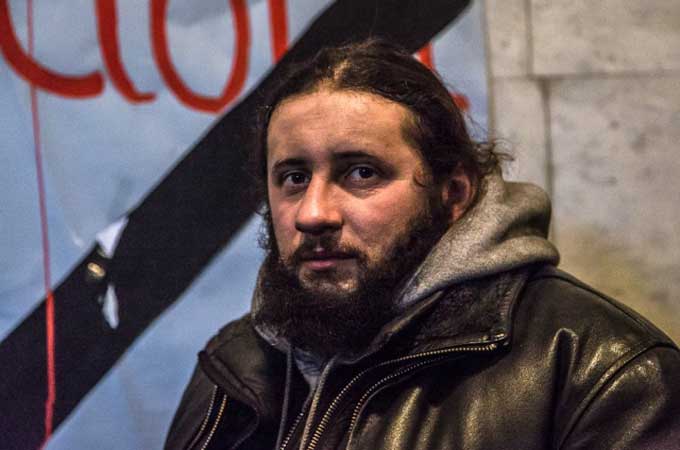Hope and prayers behind Kiev’s barricades
Priests join activists on the front lines of Ukraine’s protests, as officials fear a coup ousting the nation’s leaders.

Kiev, Ukraine – Exactly a month ago, he became a face of Kiev’s demonstrations, standing between the Berkut riot police and anti-government protesters with a huge cross in his hands.
Now Alexandr Repetko – a priest-turned-activist who used to own a furniture manufacturing firm and served in the army – is holding an old baseball bat, smudged with smoke from burning tires.
“If I wasn’t here… if the government doesn’t get changed now, after five years, my daughter will be here and they [Berkut] will break her head or shoot her down,” Father Alexandr tells Al Jazeera with a soft voice inside Ukrainian House, an occupied Stalin-era exhibition hall.
 |
| Alexandr Repetko, priest-turned-activist [Svetlana Ivanova/Al Jazeera] |
The 36-year-old father of three says he came to Kiev from his native Dnipropetrovsk on November 30 as soon as he heard of a police crackdown on protesters. Denizens angered by President Viktor Yanukovich’s rejection of a key trade deal with the European Union – in favour of closer ties with Russia – had taken to the capital’s streets, camping for weeks in the bitter cold.
“Neither the EU, nor the association [agreement], not even the support for the students motivated me to join, but the fact that they were savagely beaten up. It disgusted me,” Repetko said.
A peaceful pro-EU demonstration turned into a call for a revolution just 24 hours after the Vilnus summit that aimed to bring Ukraine closer to the 28-state European bloc.
“The government didn’t leave another option for the people. First they said that we would move towards the EU, then they said no. They said they would not use force against peaceful protests, then they did. People lost trust in the government,” Ihor Ziyvski, an anti-government activist, told Al Jazeera.
“We are all here for one idea. We want to make the president resign and go back to the constitution of 2004 [that gave parliament more power],” said Dmitri Sidorinko, an activist from Kharkiv. “We will be here until the end, until victory.”
Anti-protest sentiments
Not everyone seems to support the voices demanding the change of the authority that has been in power for more than seven years.
The anti-government activists – who organise themselves as if they were a battalion, wearing masks, helmets and cheering the slogan: “Glory to Ukraine, Glory to the Heroes” – are seen by some more as thugs than saviours.
“However bad the government, it keeps things under control. Those people out there are an uncontrollable mob, the radicals. They are not listening to anyone. They are unemployed, hopeless people with an urge for a conflict. I mean, these are the people who, even under normal conditions like to fight and will fight. Here [at the rally] they have been given a reason. They are in their element,” said a security officer at the Khreschatyk hotel in Kiev, just metres away from the scene of the standoff. He asked Al Jazeera not to name him.
Some protesters do not help boost the reputation of the opposition movement.
Haikamada is a retired police major from Lvov. The tall 50-something-year-old sports a shaved head with a long tail of hair sprouting from the middle of his scalp. He told Al Jazeera that Lvov city residents would not leave Kiev until they “see the brains of Yanukovich and the intestines of [the already resigned Prime Minister Mykola] Azarov on the asphalt at the spot where they shot our children”. He insists he is not saying this metaphorically.
Oleh Kalashnikov, a leader of the Combined Arms Union of Ukraine, told government supporters gathered near the parliament building that the country was “facing a coup”.
“I am calling on extremists to stop destabilising the country,” Kalashnikov shouted from the stage.
Uncertain future
While central Kiev is dotted with tents sheltering protesters from across the country and the riot police keeps a watchful eye on activists in helmets and hand-made protection vests – not exactly bullet proof – most of the rest of the three million residents of the city are trying to live a normal life.
“They can be divided in four groups,” Artem Zinovyev, a waiter at Khreschatyk hotel restaurant, says. “Those who support the government and want Berkut to use as much force as needed to disperse the rally. Others who want the change. Some are neutral, but feel sorry for victims of police violence. And there are also people who think it a conspiracy theory that the whole thing is the trick of countries like Romania and Russia who want to grab Ukrainian lands that they consider to be theirs.”
He laughs at the theory, but fears “Russia will use the same trick it used in Georgia [in 2008] when it said it was intervening to protect the Russian nationals.”
Nikolai, the anti-government activist and a veteran of the Soviet invasion of Afghanistan who refuses to give his surname, says that Ukraine would never be able to fully shake off its common historic roots with Moscow, but he insists the country still needs to move towards Europe “for the sake of development” and “the protection of our rights”.
Father Alexandr says he is not a political analyst and does not know which path the country should take. However, he believes that if the Yanukovich government stays on, “so will the corruption, the injustice, and the repression”.
Follow Tamila Varshalomidze on Twitter: @tamila87v